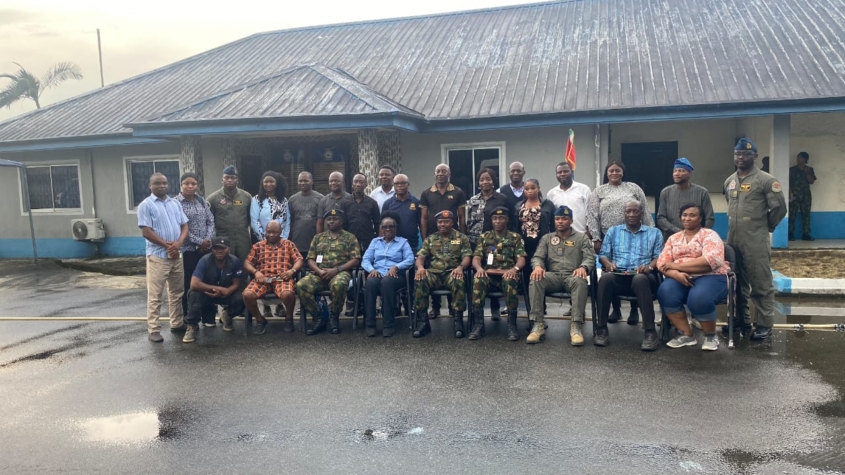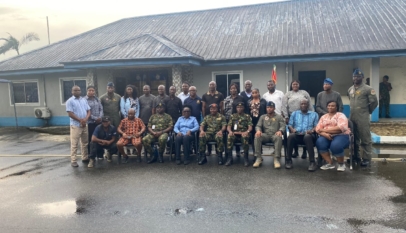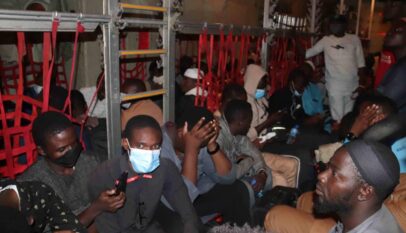
Nigerian Air Force Conducts Precision Airstrikes Against Oil Theft in Niger Delta
Folarin Abiodun
*Destroyed 49 illegal cooking tanks, 16 boats between January to May 2025*
ConcisedailyNews – The 115 Special Operations Group of the Nigerian Air Force, which serves as the air component of Operation Delta Safe (OPDS), has stated that its airstrikes targeting crude oil theft and illegal refining operations in the Niger Delta have been conducted with precision to avoid collateral damage.
Group Captain Abdulafeez Opaleye, Commander of the 115 Special Operations Group, made the disclosure during a press briefing with defence correspondents from Abuja on a media tour of the unit’s base in Port Harcourt.
Highlighting the activities of the Air Component of OPDS, Group Captain Opaleye said the unit has effectively deployed its air assets to identify and destroy numerous illegal refining sites, as well as neutralize oil thieves operating in the region.
Between January and May 2025, the unit destroyed 49 illegal cooking tanks, 16 boats, and 20 reservoirs/drums used for the storage of stolen crude oil and refined products.
He further disclosed that the air component conducted a total of 172 missions within the period, clocking 268 hours and 40 minutes of flight time and consuming 87,938 liters of Jet-A1 aviation fuel.
“The unit, as the air element of OPDS, also deploys ground troops in collaboration with other sister security agencies for Internal Security (IS) operations within the state,” Opaleye explained. “The IS operations serve as a standby force to combat criminal activities in the state and surrounding areas.”
He noted that the IS teams are routinely deployed to both known and suspected hotspots based on intelligence, and their operations are characterized by fluidity, flexibility, and intelligence-driven decision-making.
Explaining how targets are identified and selected for airstrikes, Opaleye said: “Some of these locations are initially scanned, and even when access is difficult due to potential resistance or ambushes, our aircraft can reach and strike those targets with accuracy. Using onboard surveillance cameras, we can identify and measure targets precisely to minimize collateral damage.”
He added that the unit sometimes requests additional Intelligence, Surveillance, and Reconnaissance (ISR) support before carrying out operations.
“These ISR teams help verify suspected illegal activities, review surveillance footage, and assist in decision-making before missions are launched. This ensures that every air operation is efficient and cost-effective, especially considering the high cost of deploying aircraft,” he said.
Opaleye emphasized that the goal of the operation is to protect oil and gas infrastructure without causing additional harm or damage.
He also noted that criminal networks have evolved their methods, moving illegal refining activities further from pipeline routes to avoid detection.
“Previously, these activities occurred near pipelines, but now we’ve seen them operate up to 1,500 meters away from the source. They tap into pipelines during maintenance operations and run hoses as far as 10 to 15 kilometers into remote areas, especially deep within forested mangroves,” he said.
“In some of these places, there is no visible sign of activity on the surface. However, we are able to detect, confirm, and destroy these illegal operations with precision.”
He stressed that the Air Force is committed to avoiding civilian casualties during operations.
“Our strikes are designed to be as accurate as possible. While we are targeting criminal activities, we are also mindful of the human element. So far, there have been no reports of civilian casualties from our operations. Any reported collateral damage has not involved human lives, and we remain extremely cautious in that regard,” he concluded.








